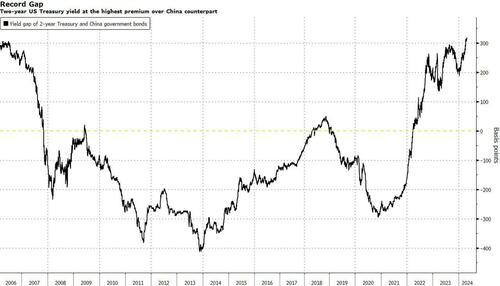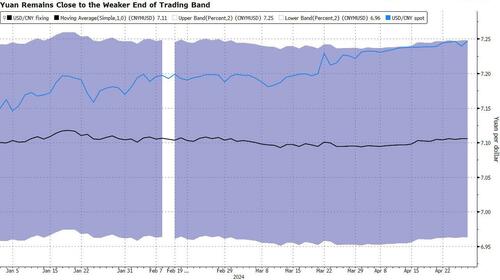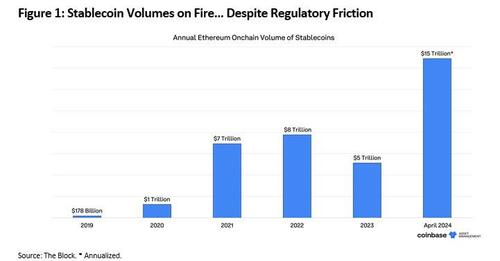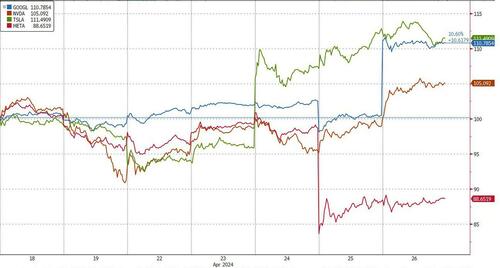PM Orbán At CPAC: The 5 Methods Of Oppression Liberals Use To Silence Conservatives
Authored by John Cody via ReMix News,
In the run-up to major elections across the West, including the U.S. presidential election and the EU parliament elections in June, Hungarian Prime Minister Viktor Orbán warned that conservatives face unprecedented pressure from liberals, who are lashing out over fears they may lose power.

During his speech at the third annual Conservative Political Action Conference (CPAC) in Budapest, Hungary, Orbán described five methods of oppression being deployed by liberals to silence the opposition, with the Hungarian prime minister noting that some of the most advanced forms of oppression, including court action and intelligence service spying, are already being deployed against conservatives across the West.
1. Change the meaning of words
The first step Orbán describes is liberal actions designed to change the meaning of words and phrases in order to mislead the people, with the issue of migration being the most substantial example of this trend.
“The first step of progressive liberals, their oppression, is to make normal mean the exact opposite. War is peace. That is what progressives still say today. The Peace Facility. That’s the name of the Brussels financial fund from which the most destructive weapons are sent to the front. Migration is a resource, they say, while crime is rising, the threat of terror is increasing and trust is being drained from our societies,” said Orbán.
Orban noted that Hungary has been able to withstand this sea change, making it a “unique location in all of Europe.”
“It is the fact that, while the whole of Europe is being swamped by an ocean of progressive liberalism, a conservative island has survived (in Hungary), an Island of Deference, defying the liberal tide, the Brussels blast, and the Washington hurricane. Not only defying but surviving, even thriving, even succeeding, even triumphing and triumphing again and again.”
2. Invert everything that is normal
The second step on the path to liberals maintaining power is to invert everything that is normal, including sexuality, education, family life, love of country, and ethnic homogeneity.
“The second step is to start spreading this inverted normality by state means. Anyone who thinks otherwise is problematic. There is something wrong with that. Anyone who disagrees is either ignorant or insane. The perception must be that listening to them would lead to some fatal disaster,” said Orbán.
This method helps tear families apart, mock cultural and national traditions, and normalize behavior that up until just a few decades ago was considered beyond the pale, Orbán told the conference, adding that liberal subversion had led to “crashing birthrates, soaring divorces, broken families, and a failing education system that focuses more on ideology than academic greatness.”
“All of this is fertile breeding ground for left-wing parties to thrive and paint conservatives and the right as “backward” and deserving of political suppression and even outright violence,” he said.
3. Make the right into a “security threat”
The next step is to create an aura of “danger” around right-wing and conservative views, which will help the state justify any action taken against conservatives. In the United States, this includes, for example, portraying supporters of Donald Trump as terrorists, or equating any right-wing view as “Nazi.”
“You are made to believe that you hold dangerous views and that you are also a security risk. They send some kind of democracy watchdog at you, which then finds out that you do not share the views of normality they preach, and are therefore a radical whose freedom of speech can be safely restricted,” Orban said.
This particular step has played out across social media, where conservatives and the right face enormous censorship. However, NGOs and organizations, many of whom are lavishly funded by governments, corporations, and billionaire oligarchs such as George Soros, are actively working to silence and persecute conservatives. As Remix News has reported, they are deeply embedded in the major social media networks, and work to police conservative thought and views.
Demonizing conservatives was also evident just last week in Brussels after another conservative conference in which Orbán and many other high-profile politicians from Europe were speaking, was shut down by the local mayor citing public safety concerns.
It took the lawyers of the National Conservatism conference to file last-minute motions in Belgium’s top administrative court to ensure the conference could continue for its second day.
4. The press goes on the attack
In the fourth step, the liberal press targets you, often personally, while the state turns civilians into a mob of informers, Orbán warned.
“They deploy activists who use legal means to silence you. Then, the often anonymous profiles on the internet come to denounce you on social media, while a plethora of civilians bombard the courts and state bodies with complaints and denunciations,” he added.
5. Send the authorities in
“And if you still have the stomach for it, and if you’re still standing, the fifth step is for the public authorities to spring into action. They receive so many complaints and denunciations that they are obliged to investigate you, unfortunately, so they become the private institutions of the progressives,” the Hungarian prime minister explained.
“They will find that the accusations of the press, the concerns of the watchdogs, are well founded, they will prosecute yo,u and you will eventually be silenced by state means. That is what they do to Hungary in Brussels, and that is what they do to conservatives in progressive, liberal European capitals.”
Orbán noted that the same thing was happening in the United States where the judiciary was being utilized in an attempt to get President Trump off the ballot for the upcoming presidential election.
He also pointed to the German government’s actions against the Alternative for Germany (AfD) party. Due unique laws in Germany, the authorities have been able to label the AfD a “definite case of right-wing extremism” in key eastern states. In turn, this gives intelligence services authority to monitor communications, including phone calls, messages, and emails, between AfD politicians and members — all without a warrant.
“This is what happened in the European Union when they tried to ban Tucker Carlson by administrative means. It is happening in Germany, where political parties are being monitored by the secret services. And it happened in Finland when they wanted to condemn a politician and a bishop for quoting Scripture. Ladies and gentlemen, that is where we are.”
A new era for Europe
The Hungarian leader expressed hope, however, that the tide could turn should the people desire it at the forthcoming polls across the West, including the European Parliamentary elections in June.
He said the elections could help “end an inglorious era of Western civilization” and help defeat a “progressive liberal hegemony” that has only served to bring “war, chaos, and unrest” to Europe, as well as a collapsing economy and confusion to the world.
Instead, the European electorate could vote in favor of a new “world spirit” that promotes nation-state sovereignty as its core principle.
“In that world, national interest will determine the movement of states, and each independent nation will act in its own national interest. I also believe that in a sovereign world order, the real sovereign is the people, as our guests would say, popular sovereignty.
“I hope that it will no longer be NGOs of all kinds, big business, media outlets, dubious experts, and out-of-touch academics who tell us what is right and what should be done, but elected representatives and politicians elected by the people.”
In a rallying cry to fellow conservatives, Orbán urged them to “saddle up, arm up, take to the battlefield, and let the electoral battle begin,” calling for a “return to the peaceful and secure path that made the West great.”
“Make America Great Again, Make Europe Great Again. Go, Donald Trump! Go, European sovereignists!”
Read more here...
Tyler Durden
Sun, 04/28/2024 - 08:10











 Image via US State Department
Image via US State Department PM Gaston Browne of Antigua meets with President Xi Jinping in Beijing, January 2024. handout
PM Gaston Browne of Antigua meets with President Xi Jinping in Beijing, January 2024. handout Activist John Earle Sullivan reacts to the shooting of Ashli Babbitt that he filmed outside the Speaker's Lobby at the U.S. Capitol on Jan. 6, 2021. (Sam Montoya/Special to The Epoch Times)
Activist John Earle Sullivan reacts to the shooting of Ashli Babbitt that he filmed outside the Speaker's Lobby at the U.S. Capitol on Jan. 6, 2021. (Sam Montoya/Special to The Epoch Times) The exact moment Capitol Police Lt. Michael Byrd fired his Glock 22 pistol at Ashli Babbitt at the Capitol on Jan. 6, 2021. (JaydenX/Screenshot via The Epoch Times)
The exact moment Capitol Police Lt. Michael Byrd fired his Glock 22 pistol at Ashli Babbitt at the Capitol on Jan. 6, 2021. (JaydenX/Screenshot via The Epoch Times) Jan. 6 defendant John Sullivan shares a kiss with filmmaker Jade Sacker in the Capitol Rotunda on Jan. 6, 2021. She shot Jan. 6 footage of Mr. Sullivan for a documentary. (U.S. Capitol Police/Screenshot via The Epoch Times)
Jan. 6 defendant John Sullivan shares a kiss with filmmaker Jade Sacker in the Capitol Rotunda on Jan. 6, 2021. She shot Jan. 6 footage of Mr. Sullivan for a documentary. (U.S. Capitol Police/Screenshot via The Epoch Times)





 Photo published by the Russian military reportedly shows a US-made Abrams main battle tank after it was crippled during fighting near the city of Avdeevka.
Photo published by the Russian military reportedly shows a US-made Abrams main battle tank after it was crippled during fighting near the city of Avdeevka.
Recent comments